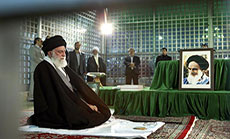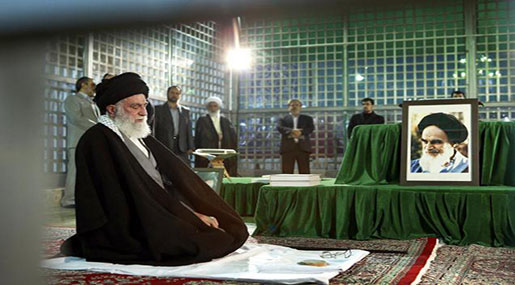
Iran’s Vision: Direct Regional Agreement without American Intervention

Hossam Matar
Does Iran really want to build a "Persian Empire"? In fact, the problem with Iran's opponents and its axis is that they analyze Iran and try to understand it according to the theories and assumptions that have long passed, as in the treatise of "empire building".

This is with regard to those with good intentions. As for the elite proxy of the United States that is anti-Iran, it is unable to build any contemporary regional project that is capable of building common interests between the peoples of the region; therefore, it bets that the broadcasting of excessive hostility towards Iran through sectarian and ethnic misinformation can be conglomerated around elites and exhausted peoples who are made satisfied with some oil "crumbs".
Iranians realize that the time of empires is over, and that international and regional policy is much more complex and fragmented than the ability to contain it within the idea of empire. Part of this Iranian realization stems from their close view- but even for their contribution- in the collapse of the idea of the "American empire" during the past ten years.
Whoever watches Iranian politics realizes that they are more interested in building its soft power, by offering attractive models as well as a realistic narrative for regional coexistence. Iranians are trying through their experience to convince peoples of the region that the choice to build a national sovereign state that is politically and culturally independent from the West is a possible option, and is subject to political and popular will. In reality, the Iranian nuclear program was important for Iran in economical terms on one hand and in symbolic terms on the other, as it is a title to challenge the West and the national, independent, capable, and modern advancement of the so-called "ISIL"; that is to say that, it is a key part of Iran's soft power, and not military power. It is illogical that the Iranians present this "model for independence" to the peoples of the region and seek to persuade them with it, and afterwards attempt to subject them to any imperial ambitions.
Iran's regional vision is based on the idea of regional integration, i.e. building a multi-layered regional system (security-political-economic) between the countries and peoples of the region ensures the security, well-being and advancement of civilization which enters the region into a generous, balanced relationship and partnerships with international powers. Of course, Iran aspires to play a leading role in the regional system, and it is an aspiration that other powers have the right to share in, such as Turkey, Egypt, Iraq and even Saudi Arabia. Yet, where is the fundamental obstacle in front of this regional project? This obstacle lies in the absence of independent regional countries, whether being subjected to systematic colonial destruction or domination of corrupt elites of other countries.
This is what justifies Iran's support for the opposition and resistance forces in the region, because these proxy systems stand in the face of national independence, and thus hinder the possibility of regional integration. On the other hand, these regimes have had direct involvement in the attempted destruction of the Iranian experience in the service of Americans (as in the case with the support for Saddam Hussein's war on the Islamic Republic). So, the basic problem between Iran and some of the regional ruling elites is unrelated to sects and ethnicities; but, the problem is in the position and role of these elites which destroy the region from within, and prevent them from advancement and attempt to eliminate all the experiences of independence as in the case of Iran, or the Lebanese and Palestinian resistance.
Iran has always reiterated the call for the establishment of a regional system, for example, with the Gulf countries, for the management of common security at the least; however, Saudi Arabia specifically insisted on the fact that the United States be a key part of this system. Also, the conclusive refusal of the Iranians to negotiate with the Americans in any matter outside the nuclear issue stems from an Iranian vision that it is better to negotiate directly with regional powers, and share interests with them and build common understandings than "paying" Americans what they do not deserve.
The question posed is: What is the logic that the United States gain stakes and interests in the region at the expense of the peoples of countries, such as Egypt, Saudi Arabia and Iraq? The Iranians want the regional consensus to be direct and not through the US channel, in order so that the revenues of the consensus go to the peoples of the region, which once the implications and results of the regional integration are tested would embolden the ruling elites to further cooperation and engaging/joining in partnerships with Iran and others away from sects and ethnicities.
The Middle East has all the elements of regional integration between countries having vast, natural resources (energy, metals, agricultural land, beaches, water) and other human resources and industrial infrastructure, large internal markets in addition to the enormous cultural inventory, which would make the region one of the most growing and prosperous regions in the world. Iran's regional aspiration is participation with Turkey and Arab regional powers to lead this system of regional cooperation and integration, which the United States objects with whatever it can.
The insistence of some regional elites on free hostility towards Iran will not prevent it from further advancement as can be seen, but it means that the United States will reap gains at their expense and then hate them for cohabiting with Iran on a little bit of crumbs and a lot of boastful fools.
Comments



